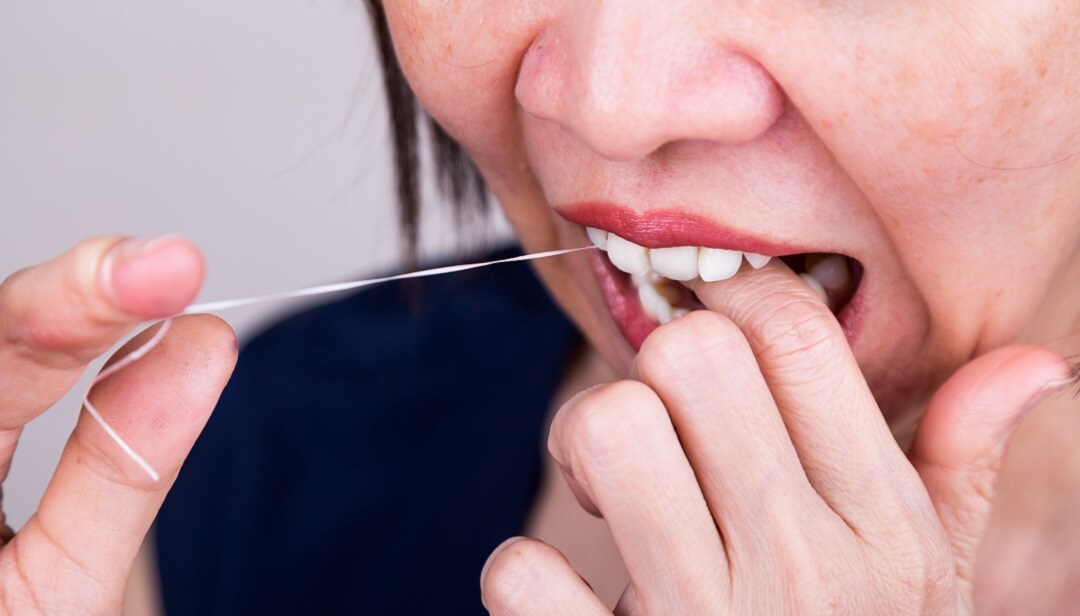If you are experiencing bleeding gums when you floss, you are not alone. Bleeding gums are common and may just be a sign of simple irritation in many cases. However, it can also be an initial sign of gum disease or other dental concerns.
At Soundview Family Dental, our goal is to help ensure our patients have the best oral health possible. We know that bleeding gums can be concerning, so we offer some information to help you better understand what may be contributing to your bleeding gums.
Key Takeaways
- Bleeding gums can be caused by plaque, poor oral hygiene, hard toothbrushes, medications, or gum disease.
- Address bleeding gums with gauze, ice, hydrogen peroxide, warm salt solution, mouthwash, turmeric paste, good oral hygiene, right toothbrush, and quitting smoking.
- Prevent bleeding gums by maintaining oral hygiene, avoiding sugary foods, eating veggies and greens, replacing toothbrushes, seeing dentist, and quitting smoking.
What causes bleeding gums?
Bleeding gums can occur for various reasons. However, one of the most common causes is the buildup of plaque and tartar around or below the gumline. This causes bacterial growth and can make the gums more susceptible to damage and bleeding.
Other common causes of gum bleeding can include:
- Poor oral hygiene
- Using a hard or worn toothbrush
- Improper use of dental floss
- Certain medications, such as aspirin, ibuprofen, or blood thinners
- Early-stage gum disease
How to address bleeding gums
When you experience bleeding gums, you want to do what you can to stop the bleeding and soothe your irritated gums. In most cases, the bleeding stops on its own, but there may be times when you need to help stop the bleeding and provide relief to your gums. The following options can help.
1. Gauze
If you experience continued bleeding, apply clean, damp gauze to the gums until the bleeding stops. This is especially necessary if you have underlying medical conditions or take certain medications, such as blood thinners.
2. Ice compress
Applying a small ice pack or cold compress against your bleeding and swollen gums can help reduce inflammation and stop the bleeding. This is especially helpful if you cut or damage your gums while flossing.
3. Hydrogen peroxide
Rinsing your mouth with hydrogen peroxide can help stop gum bleeding, remove plaque, and promote gum health. In addition, it can also help whiten your teeth. After brushing and flossing, simply swish a small amount in your mouth and spit into the sink. Do not swallow the solution.
4. Warm salt solution
If bleeding gums is a recurring problem, consider rinsing with a warm saltwater solution. This can help stimulate healing and reduce the bacteria in the mouth. Simply add a little salt to warm water and swish it around in your mouth for a few seconds before spitting it into the sink. You can repeat this several times a day to aid in the healing process.
5. Mouthwash
Rinsing your mouth with mouthwash after flossing can help address bleeding and kill any bacteria in the mouth that can contribute to gum inflammation and the increased risk of bleeding.
6. Turmeric paste
Turmeric is a natural antibacterial and anti-inflammatory ingredient, and you may already have some in your kitchen. Make a paste and apply the paste directly to the area where your gums are bleeding. Regular use can help reduce inflammation and may improve gum health.
7. Good oral hygiene
Poor oral hygiene can contribute to inflamed gums, gum disease, and an increased risk of bleeding gums. Brushing your teeth at least twice a day and flossing once a day can help reduce the risk of gum bleeding. It also ensures that your gums are healthy. Should an accident happen when flossing, your gums are likely to recover and stop bleeding much quicker.
8. Use the right toothbrush
If you suffer from sensitive gums or gum disease, the toothbrush you choose makes a difference. Hard or firm brushes are more likely to cause damage to the gums and can result in bleeding. In addition, be sure to replace your toothbrush every three to four months
9. Stop smoking
You undoubtedly know that smoking is not good for your health, but it can also greatly affect your oral health by increasing your risk of gum disease. When you cause damage to the gums, such as with flossing, it is harder for the gums to heal. Quitting smoking will reduce your risk and the likelihood of bleeding gums.
How to prevent bleeding gums
The good news is that you can do things to help reduce the risk of bleeding gums and improve your oral health. These things can include:
- Maintain good oral hygiene, including brushing and flossing daily
- Avoid sugary and processed foods as these can increase plaque and gum inflammation
- Add crunchy vegetables to your diet as they can help keep teeth clean between brushings
- Add more leafy greens to your diet to increase your vitamin K level, a vitamin responsible for blood clotting (If you are on blood thinners, talk to your doctor before changing your diet)
- Replace your toothbrush every three to four months or as soon as it shows signs of wear
- See your dentist for regular exams and cleanings
- Stop smoking
Soundview Family Dental helps you achieve optimal oral health
If you are experiencing regular gum bleeding despite following good oral hygiene, it may be time to see the dentist. At Soundview Family Dental, we are here to help ensure you have a healthy smile and help reduce your risk of gum disease and gum bleeding. Contact us online or call the office at (425) 563-6360 today to schedule an appointment and let our caring team help you achieve happy and healthy gums and teeth.


